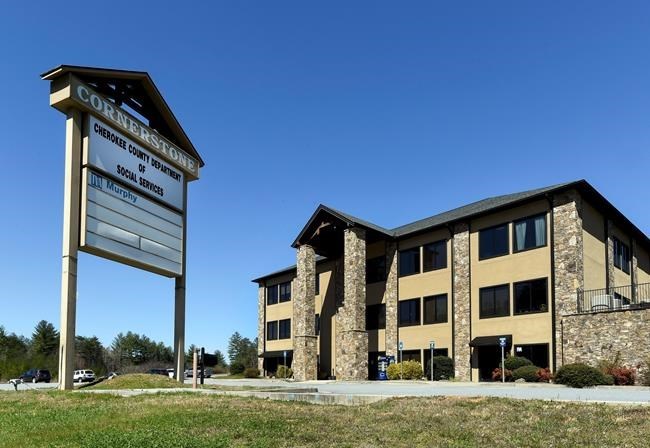
The Cherokee County Department of Social Services on Wednesday, March 14, 2018, in Murphy, N.C. For story on Brian Hogan being separated from his daughter by Cherokee County Dept. of Social Services. (AP Photo/Kathy Kmonicek)
Republished March 14, 2018 - 2:52 PM
Original Publication Date March 14, 2018 - 11:21 AM
MURPHY, N.C. - When Brian Hogan got a call that his wife had suffered a massive heart attack, he knew he had to get to the hospital fast. So Hogan asked his neighbour to take care of his 10-year-old daughter, then headed 60 miles east to the intensive care unit in Asheville, North Carolina.
What happened next would eventually expose a practice by a child welfare agency that illegally removed potentially hundreds of children from their homes in this poverty-stricken mountain community
Those same children are now facing the possibility of being uprooted again — including some who have spent years adjusting to their new lives, an Associated Press investigation has found.
Hogan said the Cherokee County Department of Social Services threatened to throw him in jail, place his child in foster care or give his daughter to another family for adoption if he didn't sign a "custody and visitation agreement," known as a CVA.
"They gave me no choice," said Hogan, 38, who told AP that child-welfare workers wanted to remove his daughter because they believed he placed the girl in an "unclean" home while he was caring for his hospitalized wife.
In order to remove a child from a biological parent, social workers must get a court order from a judge, said Sara DePasquale, assistant professor of public law and government at the University of North Carolina.
Not only did Cherokee County child-welfare workers bypass that critical legal step with Hogan, they did the same thing with dozens, possibly hundreds, of other parents, according to interviews, court documents and copies of the agreements obtained by the AP.
Because a judge and state welfare officials have determined the practice was illegal, the children are at risk of having their lives disrupted again, AP found.
Some children who are better off in their new homes might not be allowed to stay there because the agreements did not follow proper protocol. In other cases, children never should have been removed from their parents. AP found one mother of three was forced to sign away one child to her mother, but not the other two.
While many of the children were given to nearby relatives, some were placed with family members in other states. And some children, who were removed for safety reasons because their parents were addicted to alcohol and drugs, were placed in homes with caregivers some of who had also been arrested for drugs or faced other serious charges.
The practice of using private custody agreements was implemented by longtime county and DSS attorney Scott Lindsay, who was recently fired from the agency.
Lindsay declined to say why he bypassed the court system to remove children, or how many of the arrangements his agency made over the years. He provided legal services for DSS for nearly two decades.
During a recent emergency custody hearing, Lindsay said he started using CVAs in 2007 or "maybe earlier."
Attorneys representing families whose kids were illegally taken from their homes said Cherokee County social workers failed to protect countless children.
"What they did had nothing to do with protecting children," said Melissa Jackson, the attorney who discovered the practice while trying to help Hogan get his child back. She said all the agreements are illegal because they did not take place with court oversight, as required by law.
Soon after Jackson exposed the practice, the North Carolina Department of Health and Human Services sent an "urgent" letter to county agencies on Dec. 20, 2017, warning that "facilitating the completion of private custody agreements" without court oversight "falls outside of both law and policy."
Michael Becketts, DHHS's assistant secretary, said his agency has been investigating the matter and "is monitoring Cherokee County DSS and working to determine appropriate corrective action."
Cindy Palmer, director of Cherokee County DSS, declined to comment, citing pending litigation and referred questions to her lawyers, who did not respond to questions from AP.
It's unclear why child welfare workers forced parents into signing CVAs.
Many parents who signed the agreements have no idea they were illegal. Neither do the people who currently believe they have legal custody of the children.
They will all have to be tracked down and told the agreements were illegal — a move that could trigger bitter legal battles for the children and overwhelm an already strained social services agency and court system.
Tracking down some of the families might also be a challenge: Lindsay and other child-welfare workers have told judges in two hearings that many DSS "files are missing."
"We think there could be hundreds of CVAs. We may never know for sure," Jackson said.
It took Hogan more than a year, but he finally got his daughter back, thanks to Jackson.
Still, he's angry about what happened to him and others.
"I'm very upset," Hogan said. "You don't know how hard it was on my family. They need to be held accountable for what they did."
___
Associated Press researchers Jennifer Farrar and Rhonda Shafner in New York contributed to this report.
___
The AP National Investigative Team can be reached at investigate@ap.org
___
Follow Weiss on Twitter at https://twitter.com/mitchsweiss
Follow Mohr on Twitter at http://twitter.com/holbrookmohr
News from © The Associated Press, 2018